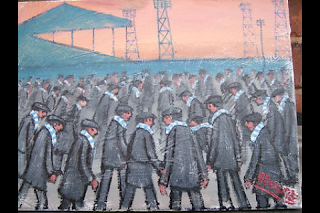The idea of 'privatisation of public services' rather infers that these services are still 'public services' just run on the behalf of the public by private enterprise. There are anticipated merits in that approach, reducing waste, improving cost efficiency, cutting-out 'job entitlement', etc. There are also disadvantages to privatisation such as excessive profit making and the need for continuous government supervision. The real problem of state operated public services being privatised is not addressed just by privatising the operation but fundamentally still retaining the states monopoly over the service. And that is not what is proposed by Rothbard.
What the "The Libertarian Manifesto" calls for is naked capitalism - unregulated by any form of state mechanism; because there is no state! So any service the public generally wants to purchase is totally open to be offered by any business that wishes to tackle that market. If the service provider provides a poor service/price equation people soon vote with their feet and that company goes out of business. If a company offer a good package, insurance that includes a certain proportion of charitable contribution for example, people will buy their service if the offer is compatible with what they value.
Every example (I can think of) of capitalism taking unfair advantage of and manipulating the marketplace can be drilled-down to find eventually it is actually dependent on the existence of 'the state' and taking advantage of the authority and regulation of the state.
Monopolistic business practices in themselves are not actually a problem, a company that offers an unbeatable price/service in a free market deserves to, and will by default, gain a monopoly. The problem comes when the monopoly is gained by means other than just an unbeatable price/service mix within a free market. For example Standard Oil 'took' the market because it found a way to circumnavigate legislation designed to prevent such monopolistic practices. Had the legislation not existed they would have been exposed to a market where every one of their competitors were also able to compete on a level field - including all attempting to work towards capturing a monopoly of the oil market. By having prohibitive legislation the state effectively caused the unfair advantage.
That the state, or elements within the state, deliberately causes disarray so to force change or to make the change they provided appear successful (a strategy Common Purpose is accused of) is not an argument for keeping services within the state. It is an illustration of why the state is not a suitable mechanism for operating such activities because the authority of the state can be, and often is, abused.
The state needs to justify its existence and does so by means of appearing to meet and by manipulating public perception. Clearly a government that just taxes and builds fabulous palaces for an aristocratic class will not be well supported for long. A government that is considered to provide 'law and order, economy and welfare, education and health, defence and diplomacy' may conversely look like they are providing not only a useful range of services in an optimal way but services imposable to fulfil without the involvement of a state. Bernays was years behind the curve.
A relatively small proportion of taxes gathered is actually spent on providing this succor to the masses but it is an investment, of the people's money, well spent on behalf of the state; for it provides the state's government with a 'democratic majority' and therefore apparent legitimacy. Democracy is a gift to those who would control the people since their willing compliance, in ignorance of the true situation, is a less costly and more productive form of enslavement than old-fashioned brutality and force. All that needs to be done is to control the political parties, their candidates and have influence over of the bulk of the media.
Belief in the legitimacy and necessity of the state is the most prevalent delusion suffered by humanity. The state is no more than a system of manipulation and control, quasi-religious in nature. The world has a wealth of resources to provide an abundance for human society but distribution of wealth has always been hampered by our innate competitiveness.
The primary method for diverting wealth to the few has been social power, power of pack leader, tribal leader, priest, monarch, the state. It is the oldest form of establishment - older than humanity itself. This power establishment has been evolving into ever deepening consolidation and is reaching a point where nations are being melded into continental unions and those unions responding to a single central global governance.
This is a dangerous time for human society - the risk is the nature and motives of the money-power that has sponsored the drive towards single world governance and the vulnerability of such a single system for tyrannical authoritarianism (multiplicity provides multiple fail-safes). We stand at a crossroad where the choice is simply between accepting the drive towards this greater global state as essential and inevitable or smashing the paradigm and allowing humanity to operate in a more natural order without centralised control of any sort.









